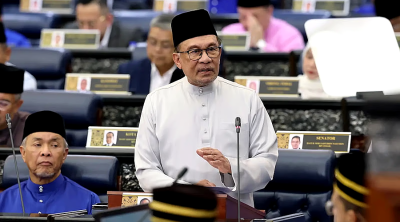
J.P. Morgan has given its approval to Malaysia’s policy reforms as well as investments in data centres and infrastructure, and has for the first time in almost six years upgraded the country’s rating from “underweight” to “neutral”.
This means Prime Minister Datuk Seri Anwar Ibrahim’s foresighted economic reforms have been recognised by an authoritative international financial organisation.
Politicians holding divergent views have been voicing their concerns with the hope the reforms would not jeopardise the vested interests of some, but for the long-term well-being of the nation, such reforms must go on undeterred.
J.P. Morgan’s Asia-Pacific Chief Rajiv Batra told CNBC that Malaysia’s first quarter GDP expanded by 4.2% while corporate profits were at an impressive level of 10 to 11 per cent, and J.P. Morgan has consequently decided to upgrade the country’s rating.
J.P. Morgan is not alone. Forbes has also given its thumbs-up to the prime minister for the three things he has executed since taking office: lobbying actively for foreign investments, subsidy restructuring, and stricter control of civil servants’ remunerations and expenditures.
In fact, the prime minister has done more right things than what Forbes has highlighted.
Since he took over the government, Anwar has been working very hard to strengthen Malaysia’s diplomatic relations with some of our biggest trading partners in an attempt to woo foreign high-tech investors here (including semiconductor manufacturing, digital technologies, EV industry and green energy).
Anwar also strives to enhance civil service efficiency by accelerating foreign investment vetting procedures, battle corruption, promote infrastructure development, and set up third EPF account to relieve the economic hardships of the people.
Additionally, he goes ahead with the highly controversial targeted subsidisation policy in order to make up for the cash assistance and subsidies for low-income communities.
The prime minister’s reform agenda does not stop here, and includes also the measure of lifting the quota restrictions on non-bumi students scoring 10A’s and above in SPM for matriculation classes, in a bid to retain the country’s talented young people, marking a positive headstart in the country’s educational reform.
Meanwhile, the possible reinstatement of the KL-Singapore high speed rail project will remarkably facilitate movements among the people living in the two capital cities while catalysing the economic development of cities and towns along the route.
Despite the lacklustre performance of the Unity Government in the recent by-election, the momentum of such reforms must not be weakened by the election defeat.
Indeed, it takes time to reverse the many ills piled up over the past decades, and we just cannot expect to see the results overnight.
Although Anwar has only assumed office for about a year and a half, he has already launched several momentous initiatives, including the New Industrial Master Plan (NIMP) 2030, and the National Energy Transition Roadmap (NETR), which deserve the strong support of all Malaysians.
The government must strive to create a healthy fiscal position to stimulate the economic development and deliver the nation out of the middle-income trap we are currently stuck in.
Rajiv Batra highlighted the reality that Malaysia has successfully pressed ahead with fiscal restructuring measures without sacrificing the country’s economic development, with the goal of achieving 5 per cent growth in the people’s incomes.
Additionally, the Public Finance and Fiscal Responsibility Act tabled by the Unity Government is set to institutionalise prudent fiscal management practices in hope of slashing the annual budgetary deficits from 4.3 per cent to only 3 per cent, and public debts from 65 per cent of GDP to 60 per cent.
The enactment of this legislative framework will ensure the sustainability of the country’s long-term fiscal policy in creating a stable and conducive environment for continued economic development.
Sure enough Anwar’s governance is not without its flaws.
There has been hardly any noticeable change in the country’s per capita GDP after it topped US$10,209 in 2011, managing only a slight improvement to $11,993 in 2022, or an unimpressive 17.4% growth in 11 years, or a meagre 1.58% per year on average.
By comparison, China’s per capita GDP leapt from $5,614 to $12,720 during the same period of time, or 2.27 times over 11 years, while Singapore’s swelled from $53,891 to $82,807.
Of course, we cannot put all the blame on Anwar alone, but these numbers should serve to remind our prime minister that he needs to work much harder.
Meanwhile, our press freedom index ranking slipped from 73rd last year to 107th. Communications Minister Ahmad Fahmi Mohamed Fadzil has offered his explanation, but what Malaysians want to see is how the government is going to improve this situation.
Our global competitiveness ranking has also declined from 27th to 34th, while our neighbours Singapore, Indonesia and Thailand have all made significant improvements.
The World Happiness Report 2024 which covers 143 countries and territories globally puts Malaysia at 59th, well behind Singapore, the Philippines, Vietnam and Thailand in the region. This means we fare poorly in social acceptance, income, health, freedom, people’s friendliness, corruption-busting effort and other indicators, compared to other regional countries.
As such, the government should prioritise the quality of living of the people.
We understand that it takes time to institute the reforms, and that setbacks and obstacles are inevitable, but that does not mean the Unity Government should back down because of that.
The government must strive to create a healthy fiscal position to stimulate the economic development and deliver the nation out of the middle-income trap we are currently stuck in.
We believe Malaysians will give the prime minister sufficient time for him to institute the reforms and put the country back to the path of robust growth.
ADVERTISEMENT
ADVERTISEMENT








































